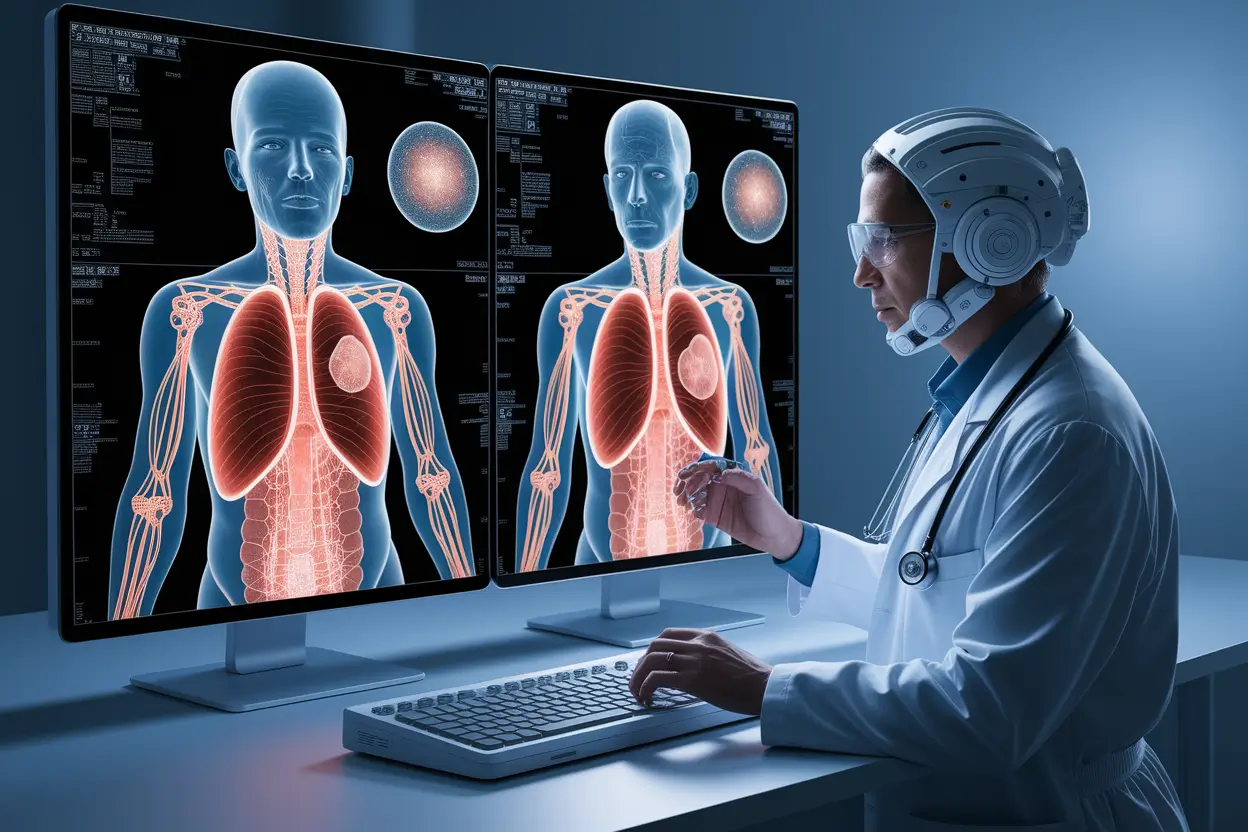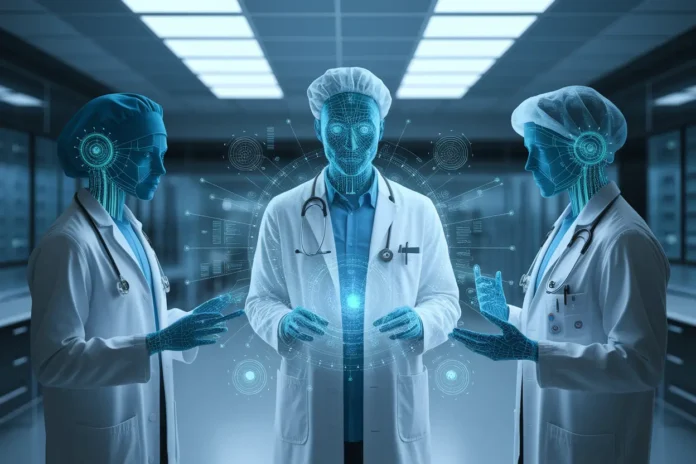Generative AI in Healthcare is rapidly transforming the medical landscape by leveraging machine-learning models that create new content, from diagnostic images to clinical text. As a subset of artificial intelligence, generative AI uses algorithms to analyze patient data and generate meaningful outputs that enhance diagnostics, personalize treatments, and optimize administrative workflows across the healthcare system.
Understanding Generative AI in Healthcare
Generative AI in Healthcare refers to the application of artificial intelligence technologies that produce new content based on learned data. These outputs include medical images, patient reports, treatment protocols, and even molecular simulations. The aim is to automate repetitive tasks, support clinical decisions, and personalize patient engagement for higher quality outcomes.
Core Technologies Behind Generative AI in Healthcare
Generative AI in Healthcare operates using deep learning models, including:
- Large Language Models (LLMs): Process vast medical literature to produce coherent clinical documentation and patient summaries.
- Generative Adversarial Networks (GANs): Generate synthetic medical images for diagnostic training and quality enhancement.
How Generative AI in Healthcare Works
Generative AI in Healthcare relies on a three-phase operational architecture:
- Data Ingestion: Aggregates and preprocesses diverse datasets like EHRs, diagnostic images, lab results, and literature.
- Model Training: Utilizes supervised and unsupervised learning to recognize complex patterns within data.
- Output Generation: Delivers clinical documentation, diagnostic insights, or synthetic annotations relevant to patient care and administration.
Benefits of Generative AI in Healthcare
Generative AI in Healthcare offers several evident advantages:
- Increased Efficiency: Automates tasks such as form-filling and medical note generation.
- Enhanced Diagnostic Accuracy: Speeds up radiology imaging analysis and increases detection precision.
- Personalized Treatment: Analyzes patient-specific factors to formulate custom care strategies.
Challenges of Generative AI in Healthcare
Generative AI in Healthcare faces hurdles before exponential adoption:
- Privacy Risks: Patient data handled by AI models is vulnerable to breaches.
- Bias in Training Data: Underrepresented datasets can reinforce health disparities.
- Regulatory Barriers: The lack of standardized AI validation frameworks.
Real-Life Use Cases of Generative AI in Healthcare
Generative AI in Healthcare has driven innovation across these domains:
Clinical Documentation
Hospitals like Mayo Clinic are using AI to auto-generate patient notes, reducing administrative burden. Microsoft 365 Copilot can scan patient records, interpret key data, and assemble structured documents.
Patient Communication
Companies like Babylon Health employ generative assistants for triaging symptoms and scheduling, helping patients access timely care recommendations through natural language interfaces.

Siemens Healthineers’ AI-Rad Companion enhances radiology workflows by automatically identifying diagnostic markers such as lung nodule measurements on CT scans, improving consistency and reducing manual errors.
Drug Discovery
Pfizer, in partnership with AWS, uses Generative AI to model molecular interactions, enabling rapid assessment of drug candidates with substantial cost and time savings per cycle.
Medical Training
Academic institutions are deploying secure GPT models for simulation-based learning. Mount Sinai’s ChatGPT Edu trains clinical staff in real-world scenarios while preserving data privacy (HIPAA compliance).
New Trends in Generative AI in Healthcare
Generative AI in Healthcare aligns with current technological and regulatory evolution:
- FDA Integration: As of June 2025, all U.S. FDA divisions are set to integrate AI tools for internal scientific analysis, accelerating approval cycles.
- Increased Funding: Companies like Abridge secure significant investments to enhance clinical dictation and AI-powered medical Notetaker systems.
- Upskilling Healthcare Workforce: Programs from Adtalem and Google Cloud are preparing professionals to deploy AI on the ground.
Technical Best Practices for Generative AI in Healthcare
Generative AI in Healthcare must be implemented with a strong foundation:
- High-Quality Data: Input datasets must be broad, balanced, and up-to-date to limit predictive bias.
- Cross-Functional Deployment: Collaboration across tech, medical, legal, and operational teams ensures safe, ethical applications.
- Continuous Compliance: Ongoing regulatory checks should validate new models and outputs.
Comparison: Traditional AI vs Generative AI in Healthcare
| Aspect | Traditional AI | Generative AI in Healthcare |
|---|---|---|
| Function | Pattern detection | Content generation |
| Use Case Sample | Flagging irregularities in ECG | Creating synthetic patient ECGs for training |
| Output | Predictions | New data or reports |
Impact of Generative AI in Personalized Healthcare
Generative AI in Healthcare allows granular, patient-specific interventions:
- Custom treatment planning based on genomics
- Treatment simulations using patient data
- Responsive monitoring tools for medication adherence
Limitations and Ethical Issues in Generative AI in Healthcare
Generative AI in Healthcare must be scrutinized against ethical standards:
- Explainability: Outputs should be understandable and auditable by clinicians.
- Dependence on Black-Box Models: Lack of transparency might decrease trust.
- Consent Management: Patients should be aware of AI involvement in care.
Steps to Implement Generative AI in Healthcare Organizations
- Identify Use Cases: Start with workflows where AI can easily augment, like medical scribing.
- Build Scalable Infrastructure: Cloud-native environments improve agility and processing speed.
- Run Pilot Programs: Test AI outputs before mass adoption and gather clinician feedback.
- Train Staff: Educating professionals ensures successful technology integration.
Future Innovations Expected with Generative AI in Healthcare
Here is how Generative AI in Healthcare is anticipated to evolve:
- AI-driven digital twins for real-time healthcare modeling.
- Real-time voice-based diagnostics using wearable devices.
- Multilingual virtual assistants for global patient onboarding.
Frequently Asked Questions on Generative AI in Healthcare
What is generative AI in healthcare?
It is the use of AI algorithms to create new medical content or insights from existing healthcare data.
Can generative AI help in diagnostics?
Yes, it can generate enhanced medical images and reports, assisting radiologists and doctors in identifying conditions more accurately.
Is generative AI safe to use in clinical settings?
When used properly with robust data governance and compliance strategies, it can be both effective and secure.
How does generative AI affect patient privacy?
It necessitates strong encryption and access control measures due to the sensitivity of healthcare data it processes.
What are some examples of generative AI tools in healthcare?
Examples include Microsoft Copilot for documentation, Babylon Health’s chatbot for engagement, and AI-Rad Companion for imaging diagnostics.
Conclusion: The Future of Generative AI in Healthcare
Generative AI in Healthcare is a powerful catalyst reshaping the medical field. From diagnostics and documentation to research and training, its applications are vast and impactful. The road ahead will involve addressing ethical concerns, enhancing transparency, and ensuring inclusivity in training datasets. When governed effectively, generative AI has the potential to elevate healthcare delivery to unprecedented levels of accuracy, personalization, and efficiency.



